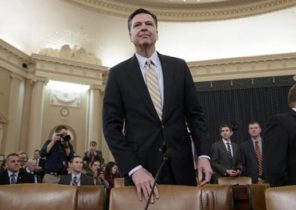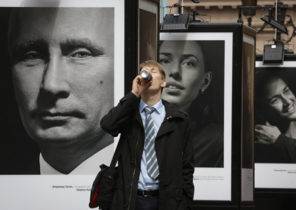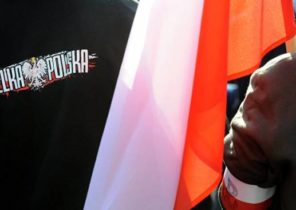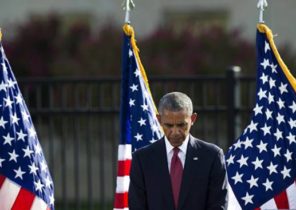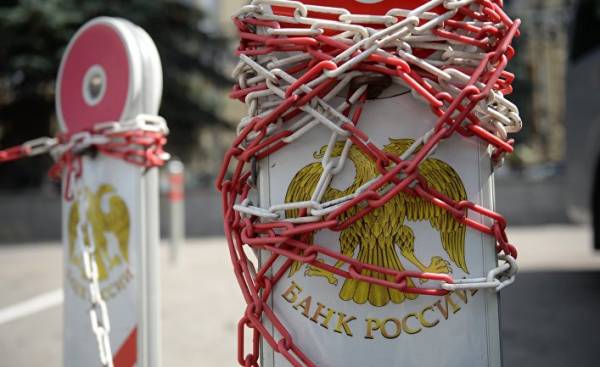
The long-debated bill on sanctions, prepared in response to Russia’s intervention in the American elections, a week ago, was signed by President Donald trump. This law serves as the basis for the extension of the sanctions on other sectors of the Russian economy; but probably more importantly, the existing sanctions will be much more difficult to cancel, almost impossible, unless, of course, to think of the amendment of Jackson—Vanik amendment, which entered into force in 1974 and was abolished only after the approval in 2012 of the Magnitsky act. How painful for Moscow, these now probably semi-permanent sanctions? More than you think.
There is a belief that began in Russia in 2014, and ongoing recession due mainly to the collapse of world oil prices and Western sanctions played only a minor, secondary role. In the degree of fallibility of this theory is in no way inferior to medieval cosmology. Say, once our eyes tell us that the Sun revolves around the Earth, so the way it really is. The same can be said about Russia and oil prices: everyone knows that this country is highly dependent on oil, oil prices collapsed and because it goes without saying that this is the main cause of all the recent economic troubles of Russia. The idea that Western sanctions have not played here an important role is what were trumpeted by Russian media propaganda, their many Western supporters and all kinds of “useful idiots” — including a range of respected economists who scrutinize the price of oil and their influence, not taking into account all other factors.
The theory of oil prices can not withstand the simplest and obvious test data. First, Russia has never cut its budget. She managed to keep spending at the same level — about 15-16 trillion rubles a year, and even slightly improve them in the crisis period 2014-2017 (in comparison with the amount of 13.9 trillion rubles, originally approved in 2014). These costs are partially paid for from the Reserve Fund of Russia, sources of financing, created in the period of major income while in the 2000s had a high oil prices — to ensure that the Russians pension payments in less fat. They are also compensated for the sharp decline in imports. Despite the decline in revenues due to the global oil prices in 2014, Russia has never faced a negative trade balance.
Oil prices fell in 2008 and in the period between 2014 and 2015, but the absolute scale of the price collapse in 2008 was more. Yes, between December 2014 and March 2015 Brent temporarily stopped on the new minimum mark, but by that time the worst for the Russian economy was already over. And although in 2008 the ruble has suffered serious losses, they are not comparable with the devastation which had befallen the currency during the current crisis, when it lost more than half its value and still can not recover. It is believed that in 2008-2009, the ruble was supported by the Central Bank of Russia, which drew significant funds from its foreign exchange reserves. But again, the numbers tell a different story. During both collapses, the Central Bank raised approximately the same amount of its reserves: 186 billion US dollars in the period July 2008 to April 2009 in contrast to the 154 billion dollars in the period between 2014 and 2015.
Turns out, it’s not just oil, right? The answer is obvious: the Western financial sanctions and international credit blockade, which from 2014 to confront Russia, not in vain.
Experts investigating the Russian financial sector tend to overlook one factor: the Russian business has considerable external corporate debt in the period between 2009 and 2014 — here’s the answer to the modest recovery of the Russian economy after the global financial crisis of 2008-2009. Russian companies and banks borrowed like crazy: their total external debt in just four years has almost doubled: from $ 357 billion in July 2010 to its highest rate in July 2014 is 660 billion dollars. For the most part it was regularly extend short-term obligations. When things with the West was going well, refinancing has never been a problem.
From reliable sources I know that when the decision was made to invade the Crimea and the Donbass, the possibility of problems with the refinancing did not occur to neither Vladimir Putin nor his inner circle of associates. Large borrowers, such as the head of “Rosneft” Igor Sechin, apparently, assured Putin that the stake is so high the profit that Western banks decide to stop lending. But Western governments — according to the same logic of the Kremlin — will never go against the interests of its key financial partners.
However, after over Donbass MH17 was shot down, of course, Western governments have done so.
This decision became for Putin a big surprise, but the sanctions have hurt the Russian economy. The result of these measures, credits lost not only the largest representatives of the Russian corporate and banking sector, included in the sanctions lists, but the majority of other Russian companies — just in case. As I said then one of the major international banker: “who knows Who these Russians decide to attack tomorrow and how they will expand sanctions lists; is worth it just to keep the Russians away.”
By the end of 2014 the total volume of Russian corporate foreign debt was reduced by $ 112 billion. The sharp fall of the ruble in December 2014 was directly driven by demand for liquidity in connection with repayment in the end of the year. Total corporate external debt continued to decline, stabilized around the current level (about 470 billion) by the middle of 2016 — almost $ 200 billion in loans since mid-2014 has disappeared without a trace.
Credit blockade also prevented Russia to get back on the road to recovery, which she followed between 2010 and 2014. Russian financial system is weak and not able to generate quality assets. A large part of Bank deposits is short-term. State reserves are seriously depleted, and Putin seems to prohibit their further plunder to facilitate the corporate sector. There were hopes that China will flood the Russian loans, however, it became clear that he is not particularly interested in it, and has no relevant capabilities. The Chinese financial system is four times less than the us and three times inferior to the financial system of the European Union. The Chinese prefer to only lend to support domestic demand and has started lending abroad only as part of its strategic initiative “One belt and one road”, which explicitly bypasses Russia party. A large part of loans is linked to the direct participation of China in the projects or the purchase of Chinese goods and services. And in any case their scope is not large enough to play a significant role.
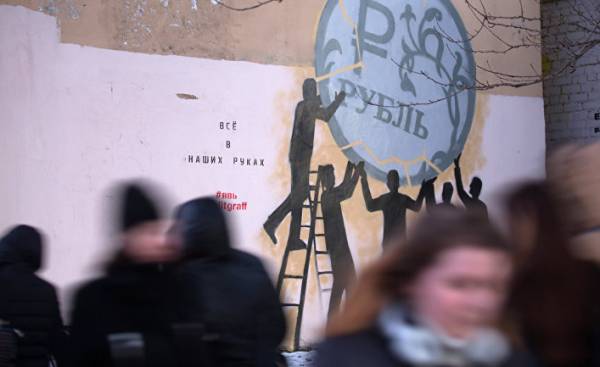 © RIA Novosti, Igor Russak | go to potamanthidae in support of the ruble in Saint-Petersburg
© RIA Novosti, Igor Russak | go to potamanthidae in support of the ruble in Saint-Petersburg
The pressure on the ruble that accompanied the credit crisis has led to a significant reduction in the standard of living of the average Russian. The reason is simple: Russian standards and availability of imports of consumer goods. In the period of Putin’s Russia is mainly redistributed oil revenues to improve living standards. Money from oil and gas was more than enough to ensure that Putin’s minions have time to cash in and thus leave the majority of the population the impression that life has become better. This negligence has led to the fact that Russia was unable to develop the capacity to produce quality consumer goods, this required a favorable investment climate, a lower degree of government intervention in business Affairs, an independent judiciary — all the things that Putin and his increasingly authoritarian and kleptocratic government hate with a perfect hatred.
In response, Putin tried to put “import substitution”, the most striking manifestation of which were counter-sanctions on imports of Western food products. But given the nature of the economic model, which he built throughout his reign, these attempts were doomed to failure. We have not witnessed the boom of young domestic firms seeking to satisfy the demands of Russian consumers, instead, highly monopolistic environment, and widespread nepotism practiced by public institutions, which naturally only led to higher prices, a severe majority of citizens, and lined the pockets of a handful subordinated to the Kremlin and agribusiness.
When in the middle of 2016, the ruble stabilized, imports began to grow again. Russian, tired of the “substitutes” and want to come back for more quality products, despite the declining level of well-being began to spend money on imports. According to official statistics, as of June 2017, the import of meat, poultry, milk and dairy products in annual terms increased by 50-60%, and the growth of domestic production was expressed either in the single digits in the case of meat and poultry or decrease — in the case of dairy products.
Russian officials continue to harp on the “revaluation” of the ruble and predicting another decline. In the context of the continued importance of consumer imports, this means another blow to the purchasing power of Russian consumers. Structural reforms that theoretically could be of great help, whether they are carried out skilfully and conscientiously, almost certainly not in the plans of the government, as it involves the de-monopolization of the national economy and a mass exit of the government from the so-called “vital strategic sectors”. Putin, of course, will not allow it, only through its corpse. As a result, today Russia is at an impasse, experiencing the most serious and prolonged decline in living standards since the collapse of the Soviet Union in the early 1990-ies.
Having said that, is not to diminish the value of collapsed oil prices. On the contrary: they remain the main factor that allows Russia to get out of the crisis. But the mere decline in global oil prices could not cause such a strong blow to Russia. The role of Western sanctions here underestimate. And the fact that they seem to cancel them soon no one is going, puts the Kremlin in a rather difficult position.
Vladimir Milov, an economist and specialist on energy issues. Former Deputy Minister of energy of Russia (2002), Advisor to the Minister of energy (2001-2002) and head of the strategic Department of the Federal energy Commission, the regulatory body of a natural monopoly (1999-2001).
